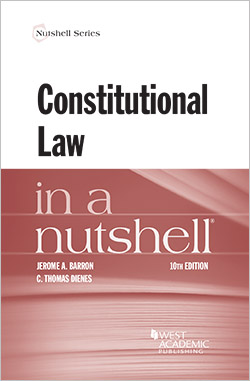- Home
- Constitutional Law in a Nutshell
Constitutional Law in a Nutshell
This 10th edition of Constitutional Law in a Nutshell summarizes constitutional law from
Marbury v. Madison (1803), to the present. The goal has been to discuss the Supreme Court's cases in enough detail to be helpful but not to be verbose in doing so. In this edition we feature thirty new cases. Some of the highlights include
Rucho v. Common Cause (2-10) where the Court held 5-4, per Chief Justice Roberts, that partisan gerrymandering is a non-justiciable issue beyond the competence of the federal judiciary. In
Department of Commerce v. New York (2019), although the Court ruled that the Enumeration Clause of the Constitution grants authority to Congress and "by extension" to the Secretary of Commerce to include a question about citizenship on the 2020 Census questionnaire, the Court could not approve it because the rationale presented to the Court was contrived and was based on a pretext. In
Timbs v. Indiana (2019), the Court demonstrated that there still is vitality in the incorporation doctrine and held that the Excessive Fines Clause of the Eighth Amendment is an "incorporated" protection applicable to the States under the Due Process Clause of the Fourteenth Amendment.
As ever, the free expression area is once again fertile ground for generating Supreme Court case law. In
Janus v. American Federation of State, County and Municipal Employees (2018), the Supreme Court, per Justice Alito, 5-4, reversed the 40 year old
Abood v. Detroit Board of Education (1977) precedent and held that its ruling requiring non-union members of a public sector union to pay for the collective bargaining of the union is a violation of the First Amendment. In
Matal v.Tam (2017), the Court unanimously held that a Lanham Act provision prohibiting the registration of trademarks that "disparage--or bring--into contempt or disrepute" any persons living or dead is a violation of the First Amendment. In the area of freedom of religion, the Court in Trump v. Hawaii (2018), held, 5-4, per Chief Justice Roberts, that a Proclamation prohibiting or limiting the entry into the United States of nationals from seven countries with Muslim majorities did not violate the Establishment Clause. The Proclamation could reasonably be justified on grounds of national security rather than religious hostility. In
American Legion v. American Humanist Association (2019), the Court held, 7-2, per Justice Alito, that the Bladensburg Peace Cross, erected in 1925 on public land in Maryland as a memorial to veterans of World War I did not constitute a violation of the Establishment Clause. Government action which removes monuments that have religious symbolism and that have long been on public land could be seen as "aggressively hostile to religion." Finally, in this edition, as in previous ones, the goal has been to present the essence of the Court's decisions in a concise, readable and understandable way.
Imprint: West Academic Publishing
Series: Nutshells
Publication Date: 01/30/2020
Jerome A. Barron, George Washington University Law School
C. Thomas Dienes
CasebookPlus™
This title is available in our CasebookPlus format. CasebookPlus provides support beyond your classroom lectures and materials by offering additional digital resources to you and your students. Anchored by faculty-authored formative self-assessments keyed to our most popular casebooks, CasebookPlus allows students to test their understanding of core concepts as they are learning them in class – on their own, outside of the classroom, with no extra work on your part. CasebookPlus combines three important elements:
- A new print or digital casebook
- Access to a downloadable eBook with the ability to highlight and add notes
- 12-month access to a digital Learning Library complete with:
- Chapter questions keyed to the casebook
- Black Letter Law questions (available in select subjects)
- Subject area review questions for end of semester use
Leading digital study aids, an outline starter, and audio lectures in select subjects
Students can still utilize CasebookPlus digital resources if they’ve purchased a used book or are renting their text by purchasing the Learning Library at westacademic.com.
With CasebookPlus, you can customize your students’ learning experience and monitor their performance. The quiz editor allows you to create your own custom quiz set, suppress specific quiz questions or quiz sets, and time-release quiz questions. Additionally, the flexible, customized reporting capability helps you evaluate your students’ understanding of the material and can also help your school demonstrate compliance with the new ABA Assessment and Learning Outcomes standards.
Learn more about this series.
Access Denied
Law School Faculty - Sign in or Create an Account to access this content. Law faculty who have created an account can sign in after receiving email notification that registration has been approved. Email accountmanager@westacademic.com or call 800-313-9378 for assistance.
Other Higher Education Faculty who wish to access digital review copies or teaching resources should contact their West Academic Account Manager at college@westacademic.com or 800-360-9378.
Adopters Only
This content is intended for adopters only. Sign in or Create an Account to access this content. Law faculty who have created an account can sign in after receiving email notification that registration has been approved. If you are an adopter who is unable to access this content after signing in, contact your account manager for assistance at accountmanager@westacademic.com or call 800-313-9378 for assistance.
Access Denied
Sign in or Create an Account to access this content. Faculty who have created an account can sign in after receiving email notification that registration has been approved. Contact us for assistance.
Law School Faculty: email accountmanager@westacademic.com or call 800-313-9378.
Other Higher Education Faculty: email college@westacademic.com or 800-360-9378.
Access Denied
Higher education faculty who wish to view this document should contact their West Academic Account Manager at college@westacademic.com or 800-360-9378.
